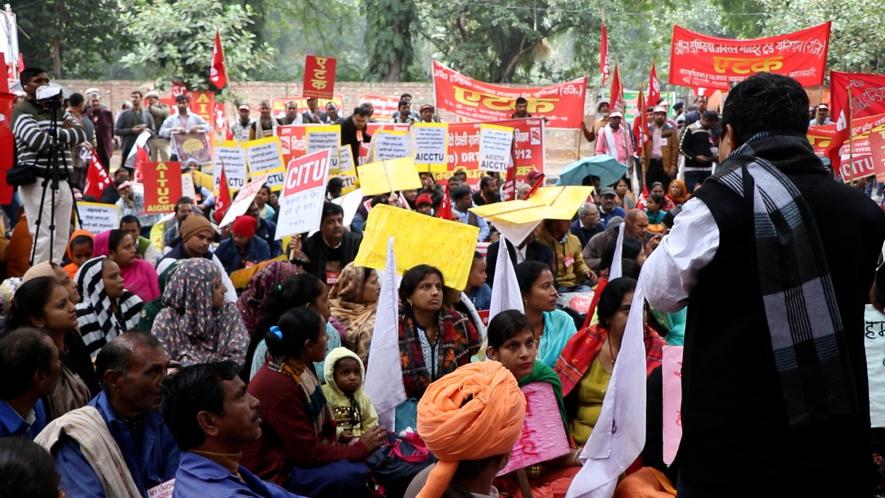A three-day countrywide Mahapadav or Mega March by Indian workers and farmers concluded on Tuesday, November 28. The call was given by central trade unions (CTUs) and the Samyukta Kisna Morcha (SKM), an umbrella organization of farmer’s movements.
The joint mega march was organized in all State capitals to demand the implementation of a 21-point demand charter of farmers and laborers against the “corporate-communal nexus” of the Bharatiya Janata Party-led National Democratic Alliance government headed by Narendra Modi.
On the third day of this historic nationwide protest, thousands of farmers and laborers united against the “anti-farmer, anti-labor and anti-people” policies of the Central government and gave a call to intensify their agitation.
While in most state capitals, the joint platform of workers and farmers submitted a memorandum of demands to the Governors, in Delhi, farmers and workers gathered at Jantar Mantar near Parliament. For two days, the protest was held outside the office of the Lieutenant Governor.
Addressing the gathering, Amarjeet Kaur, secretary of All India Trade Union Congress (AITUC) said the protest was “historic”, as it was not just a three-day protest, but the culmination of a month-long campaign across all states. “Farmers and workers went to villages and hamlets and raised awareness among the common people about these issues and demands,” she said.
“The real success of this Mahapadav is that millions of people of the country have understood that religious issues are being raised to divert them from their real issues. Their unity is being divided on the basis of communalism [politics of religious polarization],” said Kaur, adding that “workers and farmers will not just talk about communalism but will also mobilize people on these demands”.
The dates of this protest are historic because on November 26, 2020, the historic farmers’ movement started with the call of “Delhi Chalo,” [March to Delhi] and went on to fight a long battle against the pro-corporate policy of the Central government and forced it to withdraw the three farm laws.
Speaking to NewsClick, Vikram Singh, the finance secretary of All Indian Kisan Sabha (AIKS), said this protest was the beginning of a long struggle. “This government is working only for the benefit of capitalists,” he added.
“Today, farmers and agriculture in the country are facing a very serious crisis. Farmers do not get the right price for their crops due to which their debts are continuously rising. As a result, many of them have migrated to the cities and are working as daily wagers,” said Singh, adding that through this Mahapadav they have realized that “it is important to unite and fight against those who exploit farmers and workers,”
Singh said “in 2024 [parliamentary elections] we will not allow a government that makes policies against us. That’s why we have given the slogan: ‘Remove BJP, Save the Country’.”
Pushpendra Singh, Delhi Vice-President of Centre of Indian Trade Unions (CITU), told NewsClick that the BJP government was failing to fulfill any of its promises. “On one hand, labor codes have been brought in to enslave the workers, while on the other, the promise to double farmers’ income has resulted in their income being reduced to half.”
AICCTU leader Shweta Raj said this government was not concerned about workers. She said after this Mahapadav, the CTUs and SKM will meet again and decide the future course of action.
In their memorandum, farmers from the State of Haryana said they had been camping in Panchkula for the past three days against the “betrayal” by the Central government in not implementing the written promises made at the time of suspension of the historic farmers’ movement. They said if their demands are not met, they will march to Delhi once again.
Through the Kisan-Mazdoor Mahapadav, farmers and workers are demanding legal guarantee for a Minimum Support Price for crops, repeal of the four labor codes, regularization of scheme workers, reinstatement of the old pension scheme (OPS), employment for youth, and a halt to the privatization of public sector firms.
The other demands include a hike in minimum wages, as well as an increase in wages and working days under the rural employment guarantee scheme, curbing inflation, and guaranteeing food security, among others.
The protesters also demanded a stop to “dictatorial” attacks on the media, such as on the portal NewsClick, the repeal of the draconian anti-terror law UAPA and release of arrested media personnel, as also an end to polarization on religious basis.
This article first appeared on NewsClick





